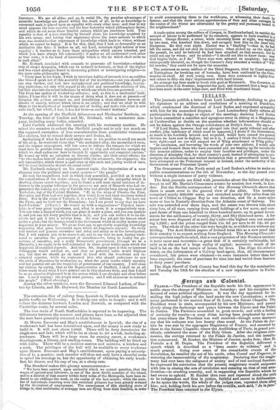IRELAND.
The journals publish a letter from Lord Londonderry, declining to give his signature to an address and resolutions of a meeting at Dundrum, which condemned the dismissal of Lord Roden and expressed sympathy with him for his unmerited disgrace. Lord Londonderry flatly refuses all participation in the design or object of the meeting; deeming Lord Roden to have committed a manifest and egregious error in sitting as a Magistrate at Castlewellan to decide on the question whether informations should or not be taken against the Orange combatants at Dolly's Brae. He says-
" If Lord Roden, however, had not plunged into that party tribunal and after conflict, (the indelicacy of which must be apparent,) I doubt if the Government, so much is his Lordship beloved and respected, would have caused the general distress we have now to deplore; but as it is, I confess I think the Government were right—and no one will suspect me of Whig attachment or Whig policy." "In conclusion, and borrowing the words of your own address, I would only implore and beseech those who have concocted and are beating up for recruits for this monster address, rather to employ their faculties and privileges, under the direction of Almighty God, for their country's good, instead of attempting to pro- mulgate the mischievous and wicked declaration that a premeditated insult has been attempted on the Protestant interest in Ireland, under the authority of the Government of our Protestant Queen."
The Orangemen of the North acted on Lord Roden's advice to make no public commemorations on the 5th of November; so the day passed over without a single instance of party violence.
The Irish journals are filled with jeremiades about the failure of the at- tempt to sell Mr. Martin's Connemara estates by auction last week, in Lon- don. But the Dublin correspondent of the Morning Chronicle shows that there is much error in the general view of the affair. The territory comprised nearly 200,000 acres, and stretched nearly fifty miles from the town of Clifden to Cleggan Bay in one direction, and for a score miles more or less in Easterly direction from the Atlantic coast of Galway. The sale was extended over three days, and the estate was thrown into about sixty lots, of all sizes, varying from small holdings of a few acres, and com- pact farms of from one hundred to three hundred acres, up to grand invest- ments for the millionaire, of twenty, thirty, and fifty thousand acres. A few minor lots were disposed of at each day's sale—the highest sum not exceed- ing 1,2201.; and the prices ranged from 15s. 661. per acre to 81. 12s. 6d. per acre. The whole of the other lots were bought in, or withdrawn without any bidding. The Anti-British papers of Ireland treat this as a new proof that their country is to expect nothing from England: The Morning Chronicle's correspondent recalls to mind, that a vast proportion of this Western territory is mere moor and mountain—a great deal of it certainly reclaimable, but only so at the cost of a large outlay of capital; moreover, much of the land is let on the had tenure of leases for lives. The Mayo Constitution states, on the information of a Galway land-agent, that, all circumstances considered, fair prices were obtained—in some instances better than had been expected; the rates of purchase for nine lots had varied from fourteen to forty years' purchase.
The High Sheriff of Cork County has fixed this day for the nomination, and Tuesday the 13th for the election of a new representative in Parlia- ment.


























 Previous page
Previous page